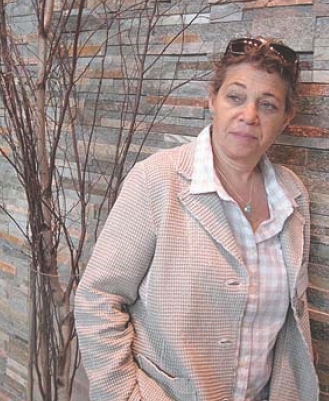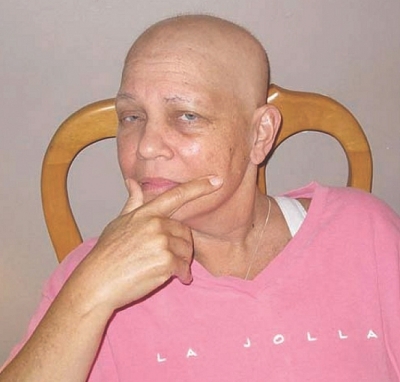The Life of Bonnie Kaplan - Deaf Community News
Posted Friday October 26 2012 at 06:26 am.
Used tags: advocacy, asl, inclusive, news, vsa

The Massachusetts State Association of the Deaf interviewed VSA's Bonnie Kaplan (BK) for the Autumn 2012 issue of Deaf Community News (DCN).
DCN: Hi, glad you could join us for this interview. Please tell us about who you are, where you went to school all your life, and how did you get to where you are now?
BK: I was born to hearing parents and have a younger Deaf brother. I attended the Boston School for the Deaf from the time I was 4 years old in 1964, and stayed until 1972. In 6th grade I was mainstreamed at a private school for girls, Brimmer and May, which is located in Chestnut Hill, and was their first Deaf student. I excelled in sports and went on to graduate in 1979. After high school I went to the University of New Hampshire (UNH) and majored in Food Service Management. In 1981, I moved out to LA and worked for Lorimar Productions as a Research Associate for several years. We studio was known for its TV shows such as "Dallas", "The Waltons", "Falcon Crest", "Perfect Strangers", "Little House on the Prairie", etc., and other TV mini series.
I returned to Boston in 1987 and decided to go back to school, taking evening classes at Northeastern University (NU) and earning a certificate in Entrepreneurship. I worked in the food industry for several years until I decided to pursue another career after working for the Massachusetts E-911 as Deaf Culture/TTY Trainer. My experiences working for E-911 eventually lead me to VSA Massachusetts in 1996. And that's where I have been all these years! I eventually got my B.A. in Business Management at NU in 1999.
DCN: We're curious about your cultural and ethnic identity. Are you religious in any form or fashion?
BK: My father was from Russia. His family (6 children) emigrated to the US in 1909 before the Russian Revolution began and moved to Boston's West End which is now known as the South End. They raised horses and transported ice and coal. My father never finished school beyond 6th grade because he had to go to work to support his family and helped my grandfather in the coal business. My grandfather, who lived to be 95, never learned how to read and write English! I have memories of him signing "X" as he couldn't write his name, or my dad would do it for him.
I'm proud of my Russian Jewish heritage. Hopefully someday I will visit Russia and learn more about my father and his life in Russia as a young boy. My mother, on the other hand, was born to Irish and Jewish parents. Her father, my grandfather, came over from Ireland and married my grandmother, who was Jewish. It was through my grandmother that my father met my mother.
My father was not allowed to marry a girl who wasn't Jewish, so he remained a bachelor most of his life and dated mostly showgirls until he married my mother when he was 54! He was 55 when I was born. My father used to joke that I was a mutt, considering my ethnic background.
My family on my dad's side was pretty religious, even though my dad considered himself a reform Jew. I was bat mitzvahed and I had to learn to read and speak Hebrew. I also read the Torah in Hebrew. Boy, did I hate going to Sunday school! Who doesn't? I am not religious, but just proud of the fact that I am Jewish and Irish (3/4 Jewish and 1/4 Irish).
DCN: Chronologically up to now, how did your leukemia impact you. Tell us about your healing and recovery.
BK: The year of 2011 will always be a year I would rather forget, but it's impossible to ignore. As I look back, I've come to a conclusion that the journey I went on through the illness has made me a stronger person and more determined to live my life to the fullest and appreciate what I have today. I never once said, "woe is me," because how could I feel sorry for myself when there are people out there worse off than me, and young children who may never live past 10 years?

I had no business feeling sorry for myself and the only choice I had was to either deal with it or not. I chose to tackle it head on and beat it.
I've been blessed all my life and lead a very privileged life. I had so much support and love from everyone ranging from my family, friends and the Facebook community, which helped me get through my darkest days to where I am today. I am now thriving and just approached the year mark since the bone marrow transplant. I was very blessed that a perfect match was found in a short period of time, as I was at the blast crisis stage, equivalent to "stage 3". All I knew of the donor was that he was a 30-year-old Jewish male. I sent him a holiday card thanking him. It had to be screened by the Stem Cell Transplant department at the Dana Farber Cancer Institute (DFCI). here are strict protocols regarding communication between the donor and the recipient. I wonder what it would be like if I ever had the opportunity to meet him in person, just to thank him for saving my life.
Needless to say, I wouldn't be here today if it weren't for everyone involved in my recovery, especially my partner and caregiver, Tabatha Patrican. She was with me from the beginning to the end of the journey and endured so much during my ordeal.
I'm happy to say that I am in remission and my blood cell counts are normal. The medical team at DFCI called me the "poster child" or rather the "poster adult" for a successful transplant. One downside is that I have to continue to take my oral chemotherapy, Gleevec, for an indefinite period of time, probably for the rest of my life. This is a miracle drug for patients with chronic myeloid leukemia (CML) and it is one of the most expensive types of oral chemotherapy. The recent passing of the health care bill couldn't come at a better time! Insurance companies are now required to pay for oral chemotherapy whereas in the past, patients were required to go to the hospital to receive IV chemotherapy because insurance companies refused to pay for the oral chemotherapy. It is a small victory for cancer survivors!
To this day, my mother still worries about my future, and I have to reassure her constantly that I will be just fine. My mother is a lung cancer survivor and my brother had Non-Hodgkin's lymphoma in the neck area. Both are doing fine with no recurrences. I guess I got the worst of it, and better me than them!
DCN: Thanks for going in depth about living with CML. We're glad you're still with us. Long life to you! Let's move on, what's your favorite thing to do? What's your pet peeve (something you hate the most)?
BK: I love watching/playing sports, camping, cooking and traveling. Reading is a hobby I picked up again during my illness. Sadly, I've somewhat abandoned it since I started going out and doing things. My biggest pet peeve is when people complain about the littlest things that are unimportant. Come on, look around you and what do you see or hear?
DCN: Life is too short for meaningless worries! A question about your work with VSA Massachusetts- -what was your role on the panel regarding LOVE PERSON play with Sabrina Dennison Weiner and Jackie Emmart? Can you share with us your views about your experience with the LOVE PERSON?
BK: I thought it was an interesting concept that Company One undertook, and I applaud them for taking the initiative to show that it can be done regardless of costs, culture and language barriers. I wish more theatre companies would follow the lead and do the same types of things, because we need more mainstreamed theatre and it needs to be more inclusive. Many organizations aren't doing enough to be inclusive and to create equal footing for all.
On June 10th, I was honored to be on the LOVE PERSON panel and share my perspectives on the whole project. If this company could do it, then what is stopping other theatre companies from doing it? Company One is a model community theatre organization and I am proud to be associated with them, even if it was brief.
Chris Robinson deserves much of the credit for bringing Company One together with the Deaf and Hard of Hearing community. Chris is truly an ally and we are fortunate to have him with us, advocating and working with us to create more inclusive theatre opportunities.
Shame on the bigger organizations that claim they can't do it because they don't have the funding or resources! "Seek and ye shall find."
DCN: What are your last words on what is special about life and what advice would you give towards living it?
BK: Just be in the present. I'm here today and I'm able to do the things that I used to do before I became sick. Today I went to the beach and was just so happy to be sitting on the beach again! I enjoyed soaking up in the sun and swimming in the ocean!
Every minute counts, as you never know what tomorrow will bring you, like the tragedy associated with the Colorado movie theater shooting during the film, DARK KNIGHT. Appreciate what you have, and count your blessings that you are here and able to contribute to society. And most definitely, do what you can to make a difference in what you do or say. That's what life is all about!
DCN: Thank you for this interview. We appreciate learning more about you and your life journey. You're a valuable part of our community in the field of creative, visual and theatrical arts and ASL access, etc. Best of luck in your continued healing. May your strength increase and vitality improve everyday.
TweetOne comment
